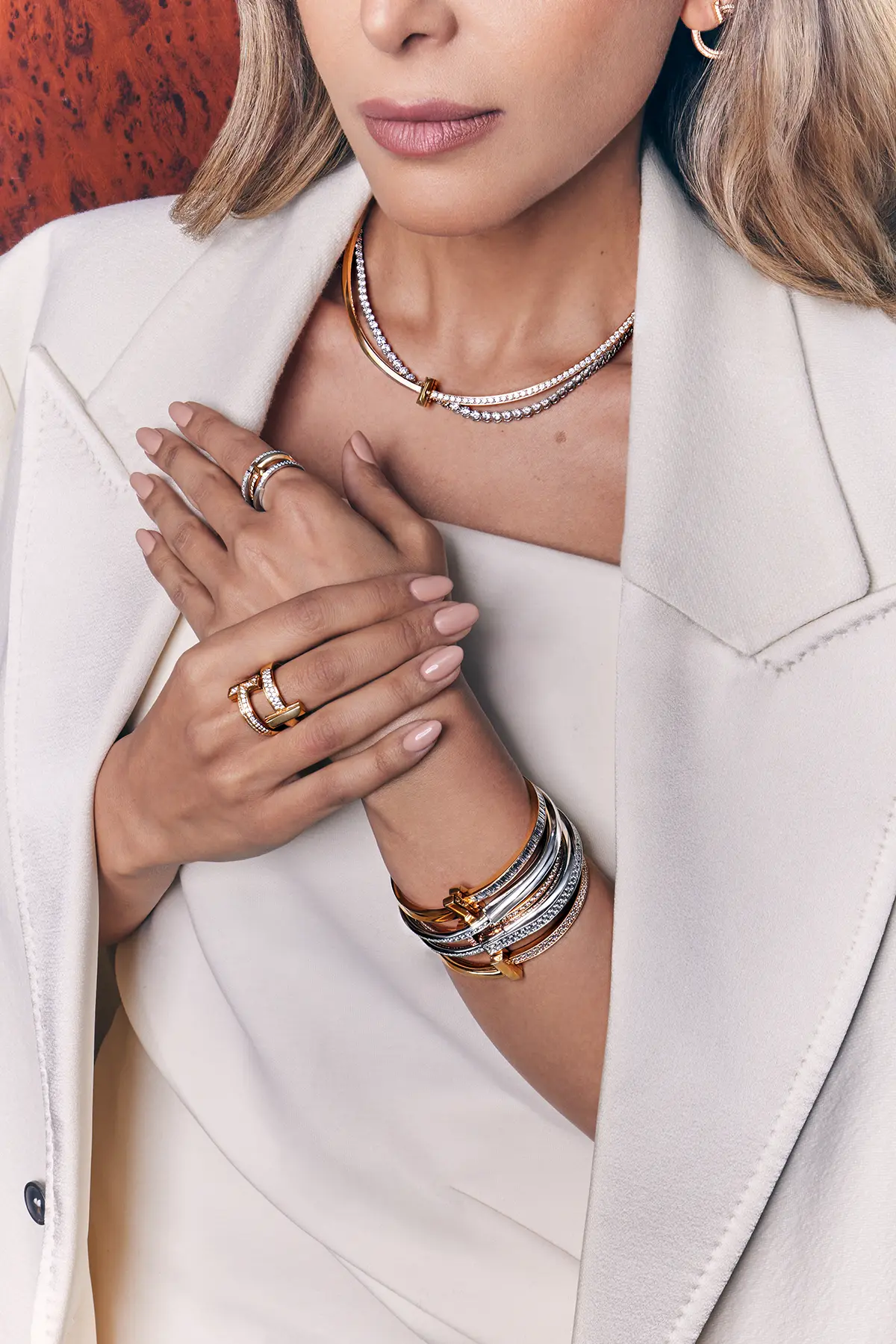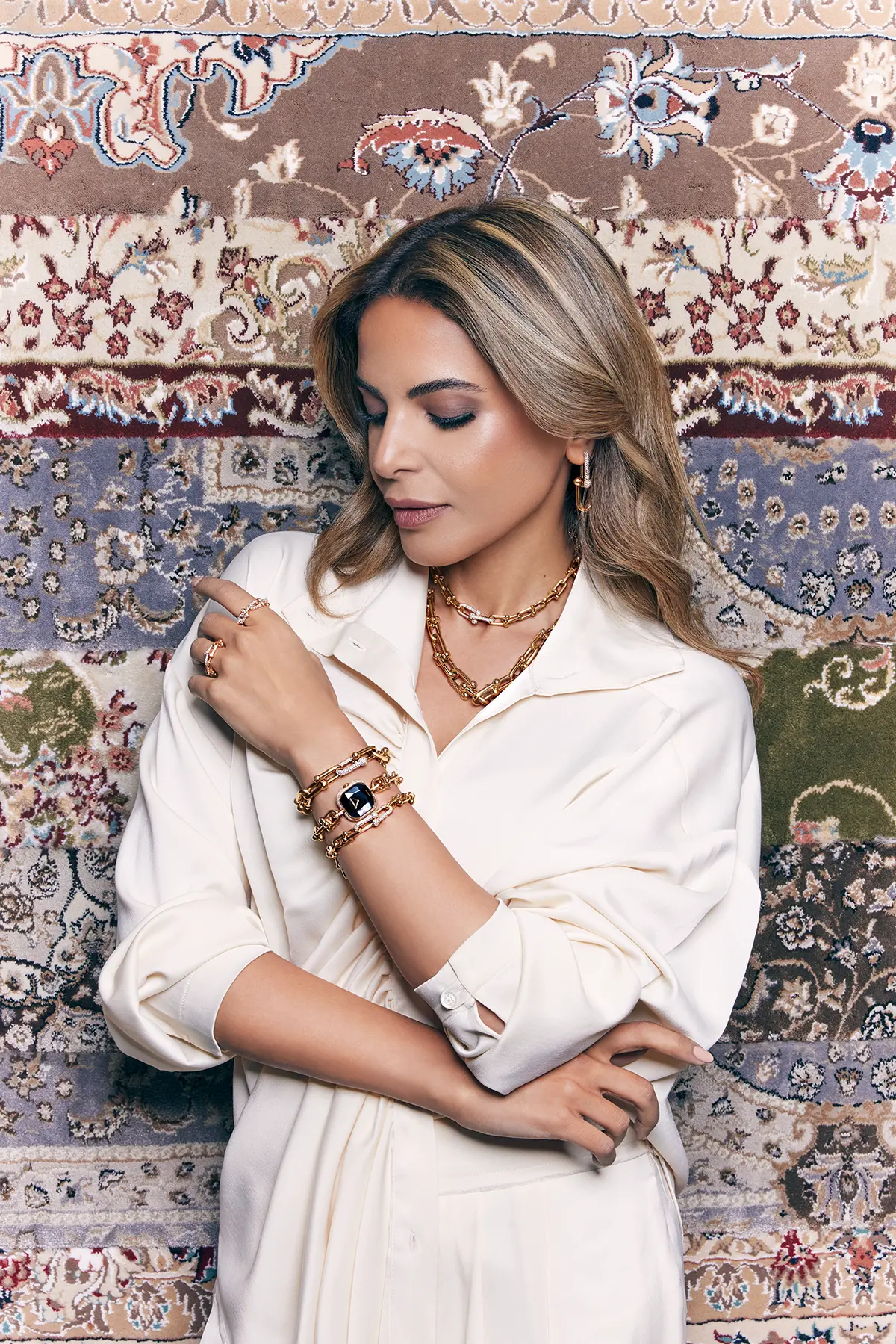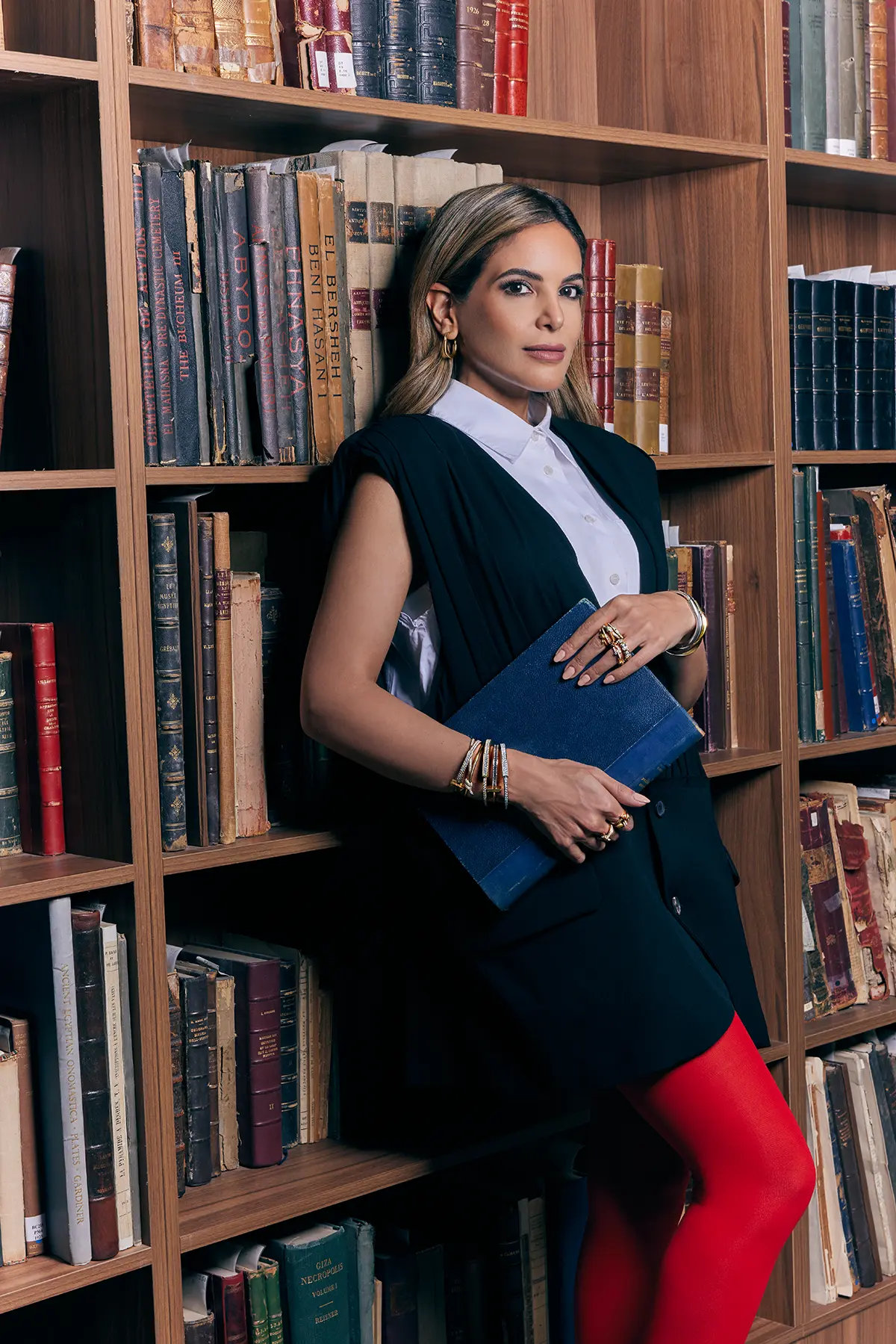Jewelry: Tiffany & Co., Fashion: Epoqueu, Makeup: beauty figure_, Hair: id Beauty Refinery, Photography: Patrick Sawaya, A special thank you to: Dai_kuwait
In a world flooded with visuals and fast-paced content, Bibi Alabdulmohsen stands out as an icon blending authenticity and creativity. With her unique style and boundless passion, she has gone beyond being just a content creator — becoming a true source of inspiration for women across the Gulf and the Arab world. Through her distinctive vision, she redefines beauty and elegance in a way that reflects her rich Khaleeji identity, all while staying true to her spontaneous spirit and warm personality.
At 3oud.com, we sat down with Bibi to uncover the untold stories behind her journey, and to explore the aspirations shaping her bright future.
What’s the most unexpected experience that shaped your mindset and style as a content creator?
Honestly, I’d say the podcast experience had the biggest impact on me. It gave me the chance to show a whole different side of myself — but still within a specific framework of topics we prepare in advance. I love being my natural self, bringing my personality into things, but without diving deep into my personal or daily life. The podcast let me express that in a really balanced and beautiful way. There’s value in the info we share, plus a fun, light vibe — people laugh, smile, and feel good listening to us. I really appreciated this shift, being able to express myself through content that benefits and entertains, without crossing into private territory. I'm at a stage where I value keeping some distance between my personal life and my professional path.
What’s your biggest fear when it comes to your career?
My biggest fear, honestly, is losing passion for what I do. It happens from time to time — I get burned out or just mentally tired. When that happens, I remind myself why I started in the first place, I take a step back, come up with fresh ideas, or just take a proper break. But yeah, that feeling of boredom or exhaustion, both mentally and physically, is what scares me the most. Thankfully, once I disconnect and spend time with myself, reflect on everything I’ve built — that energy comes right back.

Who are the people or cultures that have inspired your unique style?
There are honestly so many people who’ve inspired me — from the smallest, everyday individuals who may not even be public figures, to some of the greatest artists out there. Inspiration comes from all fields: sports, art, politics… even my own family. My grandfather’s opinion always meant so much to me, and my mother, with her background in media, has had a big influence on me too. There are so many artists I admire — people who just seem like they were born to be stars and creatives.
There’s no one specific person, really. Even someone I don't know, just passing by, could leave an impression. I'm naturally very sensitive to small things — I think it’s one of my weaknesses, but I’m learning to use it to my advantage and let it add to me, rather than hold me back. So I wouldn’t say there's one person — inspiration can come from anyone, from the youngest to the most well-known.
What’s the hardest decision you’ve had to make in your journey as a content creator?
I think the toughest decision I’ve made so far was stepping into a completely different space outside of social media — like when I tried singing or acting. That kind of move is hard because you don’t know if people will accept you or not. And when it comes to things that involve talent, like performing, people judge you more — it’s not just about being yourself anymore. As a content creator, it’s okay if not everyone relates to your personality, because that’s just who you are. But when you’re offering art — whether it’s music or acting — it’s really up to the audience to decide if they connect with it or not.
So yeah, that was a hard one. But alhamdulillah, even if I wasn’t perfect at it from the start, I’ve learned a lot, I’ve grown, and I really enjoy it. I want to keep going, inshallah.

If you were to take on a personal, unconventional project, what would it be?
If I were to start something totally different, I think it would be a shelter for stray animals. If I had the resources — like the land and the time — it’s 100% something I’d do. I really see myself doing that one day, especially when I start stepping back a bit from the work side of my life and focusing more on my personal space. I’d love to care for these souls and just spend the rest of my life with them.
What’s the weirdest item in your closet?
The weirdest pieces in my closet are definitely the ones from the Areeka podcast — from funky glasses, to wild wigs, to over-the-top makeup. These are things that people probably wouldn’t even imagine! But if you’ve watched the episodes, you already know the looks can get pretty crazy. So yeah, I’d say the strangest stuff I own are all those looks created just for the podcast.

What advice would you give Bibi Al Abdulmohsen from 10 years ago?
If I could give myself advice from 10 years ago, I’d say: be more professional and focus more on your work. Back then, I was treating it as a hobby, just for fun — but now, for the past three or four years, I’ve been taking it seriously as a career. So yeah, the advice would be to take things more seriously from the beginning. But alhamdulillah, everything I did back then led me to where I am today, and inshallah the future will be even better and bigger.
What’s one thing people don’t see — the "invisible side" of your life as an influencer?
The invisible side?
I’m actually super moody, and I really don’t like crowds or big events. But because of my job, I kind of switch into a different personality — like I seem more confident or less shy. But in reality, I’m a very quiet person. I enjoy being alone, and I keep my circle small. I don’t like noise or gatherings, so I try to avoid events as much as I can and keep my work more solo. Of course, now that I’m acting, that’s starting to change a bit. But at heart, I’m a total homebody and honestly kind of introverted.

How would you describe your first acting experience? And was acting always a dream of yours from the beginning?
My acting experience has honestly been one of the most beautiful things I’ve done — I really want to grow in it and keep learning. And this wasn’t my very first time acting; I’ve had other experiences before, with both good and not-so-good moments. But I genuinely love it — the hard parts, the beautiful parts, everything in between. I definitely hope to continue and evolve in this space, but I also hope it doesn’t take me away from what I do as an influencer. I love both worlds, and I don’t know if anyone can really juggle both — but I’m hoping I can.
And to answer the second part of the question — no, acting wasn’t something I ever dreamed of or aimed for at first. I actually used to say no to it completely. But over time, as I got to know the industry more and saw projects that really impressed me, I started imagining myself in different roles. I had a few experiences — some I loved, some I didn’t — but overall, I grew to love it. I wanted to explore more. And alhamdulillah, my latest experience in the series Fashionista was truly amazing. It’s one of the projects that made me fall in love with acting and start to dream bigger in that direction.

What’s the main difference you’ve noticed between expressing yourself as an influencer on social media and portraying a scripted character on screen?
There’s actually a huge difference. When you’re playing a written character, you get to express traits and emotions that you normally wouldn’t show in real life — things that exist in all of us, but we rarely tap into. Like anger, revenge, manipulation… portraying those in a character gives you the space to release all that energy, but in a way that’s not personal. And the audience knows it’s not you, it’s the role. That’s what I loved the most — that I could fully dive into a character and express things that people would never expect from me in real life.
How do you view the concept behind Fashionista and its role in shedding light on the influencer world?
I think Fashionista tells a real, honest, and relatable story. As someone who's been through the social media journey myself, so many scenes in the show actually reflect things I’ve experienced — from family not fully supporting you at first, to going viral for the wrong reasons, to seeing how fame can change people. Whether it’s your relationships with family or friends, sometimes things shift — either from your side or theirs. The show highlights all of that. Of course, there are dramatic exaggerations for the storyline, but honestly, so much of it felt real to me. I saw myself in a lot of the scenes.

In your opinion, what drew the audience to Fashionista? What made it stand out from other Gulf series?
I think what really made Fashionista stand out was the fresh faces in the cast — especially because the story revolves around influencers and public figures, and most of us in the cast actually come from that world. Like Asia, Mohamed Mirza, and myself — it kind of felt like we were playing roles inspired by our own peers. The directing and cinematography were also really different — I loved how the story was told through a narrator’s perspective. Visually, it looked great on screen. Plus, the storyline is light, fun, and easy to follow — something both adults and younger audiences can enjoy. It had this charm that made it appealing to everyone.
Do you plan on continuing in acting? And if so, what kind of roles would you like to explore in the future?
Yes — definitely! I’d love to keep acting. The kind of roles I want to play are anything but the typical “nice girl next door” ones. I’m drawn to complex characters — someone a bit psycho, a girl with dark or layered traits… anything out of the ordinary. I’m not really interested in doing roles where it’s just a girl living a regular life with her husband and kids — unless there’s a major twist to it. I want stories and characters that have depth, that challenge me and surprise the audience.

After your role in Fashionista, how do you see the impact of drama in spreading meaningful messages about influencers and society?
Since forever, art and drama have been one of the easiest ways to get messages into people’s homes. A character can make people love you or even hate you — that’s how powerful it is. So if there’s ever something we want to explain or clarify — like what the influencer lifestyle is really like — a show like Fashionista can help get that message across in a way that sticks.
TV is present in every home. Unlike social media — where people have to actively search for you — a series is just there, in front of them. That makes it a big responsibility for the writer and everyone involved in the project to deliver something meaningful. Even if the story touches on harsh realities or sensitive issues, as long as there’s a purpose or a message at the end — not just showcasing problems with no resolution — then that’s what really matters.
How did you feel seeing yourself on screen for the first time?
Seeing myself on screen for the first time was honestly such a beautiful feeling. Like anyone, at first I was like, “No, I don’t like how I look!” — but you get used to it. For me, I analyze everything — I start thinking, “Here I should’ve done more,” or “Here I could’ve toned it down.” It’s an amazing feeling, but at the same time, it’s exhausting because I immediately go into self-evaluation mode to improve and grow for the next time. But overall, it’s a feeling I really loved — and I can’t wait to feel it again in future projects, inshallah.






















%20event-main.webp)



